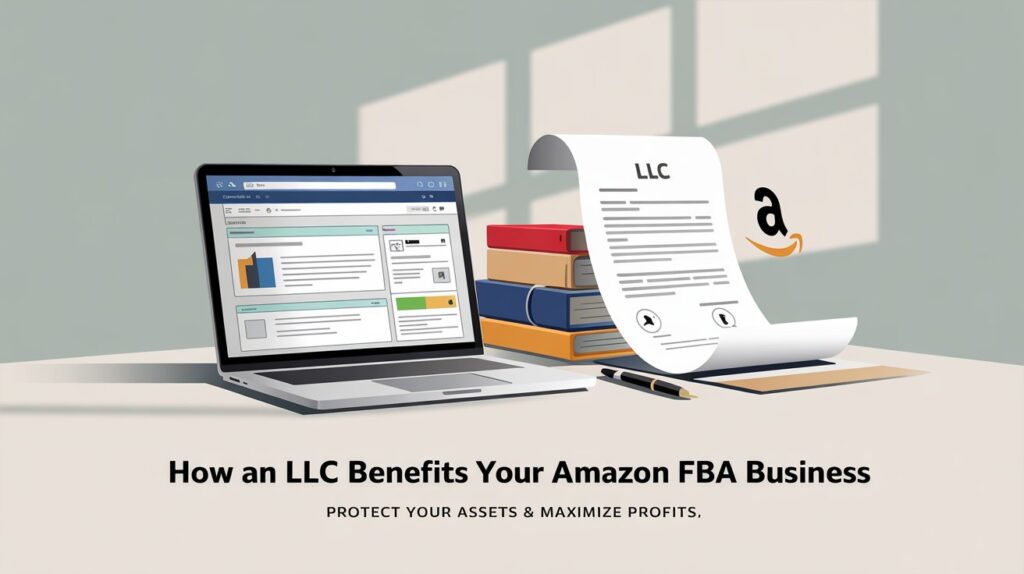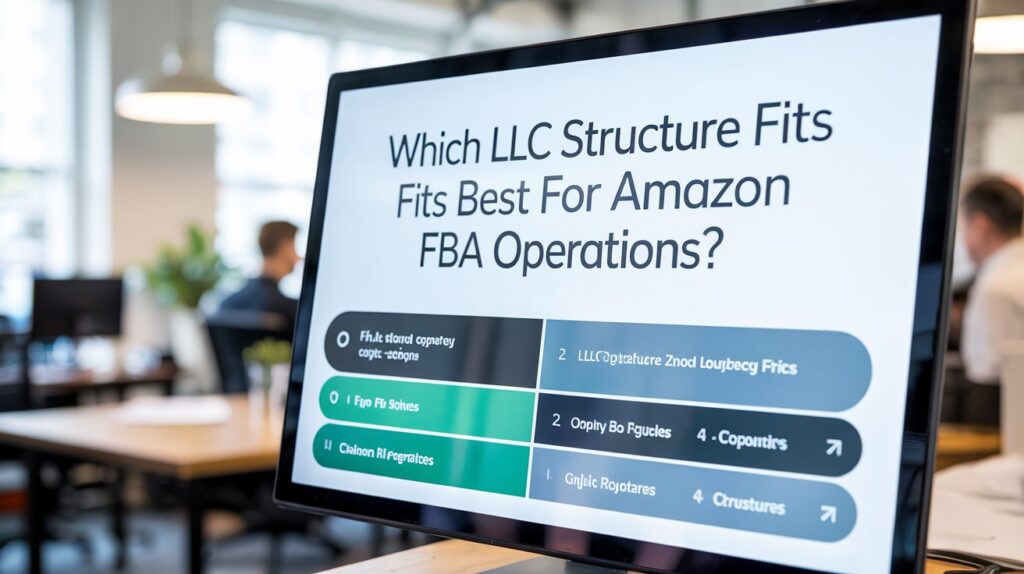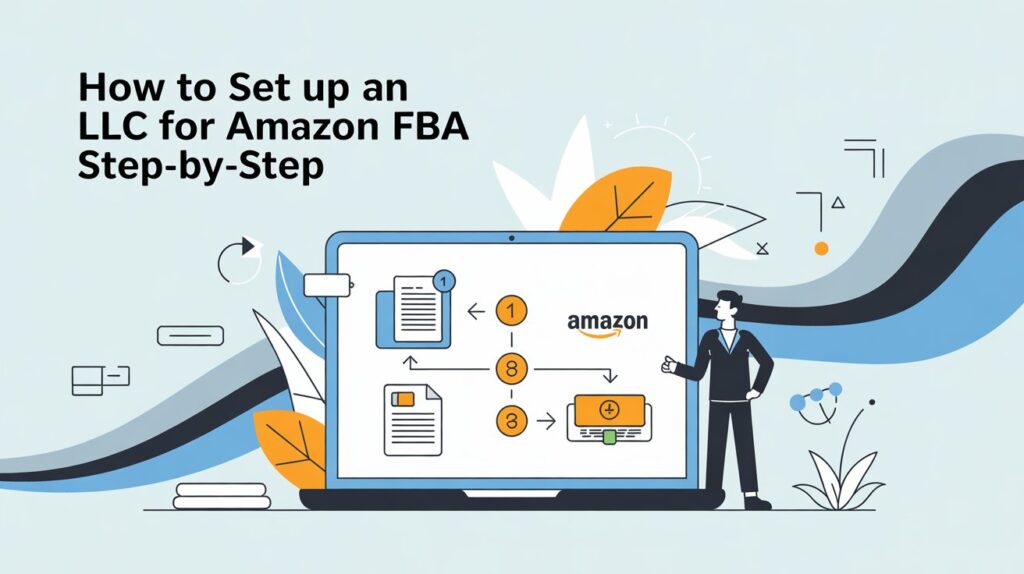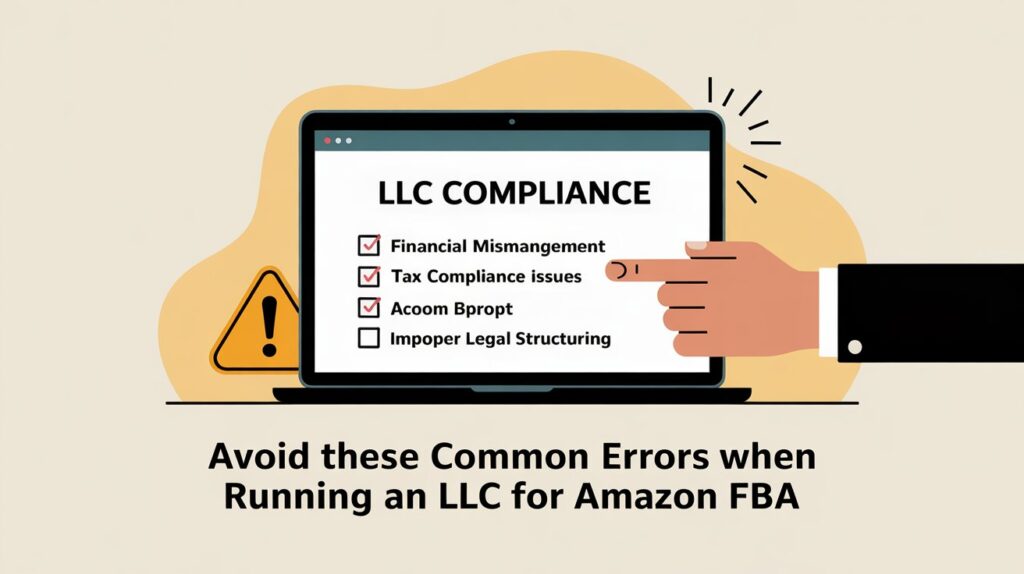
Introduction
The Amazon FBA program has transformed how entrepreneurs manage their e-commerce operations. Amazon manages storage and shipping along with customer service, enabling sellers to concentrate on product sourcing and brand development. Business momentum introduces new inquiries specifically related to legal protection and financial structure. The most prevalent critical question people ask is:
Should I establish an LLC when operating an Amazon FBA business?
Business structure selection goes beyond legal formalities because it represents a strategic choice. This article explains why LLCs are important for FBA sellers and demonstrates the correct steps to create one.
How an LLC Benefits Your Amazon FBA Business and Which Type You Should Consider

What Is an LLC and How Does It Work for Amazon Sellers
An LLC merges corporate limited liability features with the operational ease and tax perks available to sole proprietorships and partnerships. An LLC stands apart from its owners, so your personal property, such as your house or vehicle, remains protected from Amazon FBA business-related lawsuits.
For Amazon sellers, this separation is vital. An LLC gives your business operation legal protection while maintaining professional standards in all situations, from customer disagreements to supplier agreements.
Benefits of Forming an LLC for Your Amazon FBA Business
An LLC functions beyond protection and catalyzes business expansion. Benefits include:
- Limited personal liability safeguards your home and personal assets from any business-related debts and lawsuits.
- Flexible tax treatment – Your business can select its preferred tax classification between pass-through taxation by default and the options of S Corp or C Corp taxation.
- Increased credibility – Building credibility through an LLC enhances your business’s trustworthiness among suppliers, banks, and customers.
- Professional business banking – Allows businesses to access dedicated accounts and achieve superior financial organization.
- Easier recordkeeping – This feature maintains clear financial records and makes accounting procedures straightforward.
Is creating an LLC mandatory for Amazon FBA sellers? (Legal vs. Practical)
An LLC formation is not a legal requirement for accessing Amazon Seller Central. Many sellers start their operations as sole proprietors when they are testing products or working part-time.
Operating without an LLC exposes business owners to avoidable risks. Both your liabilities and the risk of facing legal or financial issues increase as your revenue and order volumes expand.
Case Study:
The Texas-based Amazon seller Sarah established her business as a sole proprietor. A malfunction in one of her private label products resulted in a customer injury which led to a lawsuit against her. Her personal bank accounts were exposed to risk due to the absence of an LLC. She ultimately settled but lost significant savings. She established an LLC which allowed her to open a business bank account and purchase liability insurance to secure peace of mind while building a foundation for her future business expansion.
Which LLC structure fits best for Amazon FBA operations? (Explained Clearly)

Single-Member LLC vs. Multi-Member LLC
The majority of Amazon FBA sellers function independently or together with a spouse/partner, which leads them to select the single-member LLC as their preferred business structure. The entity operates simply while fulfilling IRS pass-through tax standards. When starting a business with another person, a multi-member LLC enables you to outline specific roles and responsibilities while maintaining liability protection.
| Type | Ownership | Taxation | Best For |
| Single-Member LLC | 1 Owner | Pass-through | Solo sellers |
| Multi-Member LLC | 2+ Owners | Pass-through | Partnerships |
Domestic LLC vs. Foreign LLC (For International Sellers)
A domestic LLC holds registration in the state where the owner resides or where most business activities occur. The majority of sellers based in the United States typically select this option.
An LLC established outside its operating region forms in another state or overseas territory. Business sellers from overseas establish foreign LLCs in states such as Delaware, Wyoming, or Nevada because:
- No state income taxes (WY)
- Strong privacy laws
- Low ongoing fees
Using this approach enables sellers to fulfill Amazon’s business entity requirements while gaining access to U.S. financial institutions and payment processors.
LLC vs. Sole Proprietorship for Amazon FBA: Which Is Better?
Creating a sole proprietorship requires less effort and expense but exposes you to personal liability risks. Your assets remain at risk when your business faces any debt collection or legal action.
Starting and managing an LLC requires initial effort but provides legal separation from personal assets and demonstrates to partners and platforms such as Amazon that your business operation is legitimate.
LLC Tax Options: Default, S Corp, or C Corp?
LLCs offer unmatched tax flexibility. You can choose:
- Default (pass-through taxation) – Profits from your business transfer directly to your tax return under default pass-through taxation. Most common for single-member LLCs.
- S Corporation – Businesses earning over $50,000 in net income often elect S Corp status to lower their self-employment taxes.
- C Corporation – High-growth businesses need to select C Corporation status to draw investors and utilize profits for reinvestment.
The IRS reports that 90% of U.S. businesses operate as pass-through entities, including LLCs, S Corporations, and sole proprietorships.
How to Set Up an LLC for Amazon FBA Step-by-Step

The LLC formation process requires legal documentation, although each step is simple to follow:
- Choose Your State – Select your home state as your initial step in choosing where to establish your LLC. Business owners can benefit from filing their LLC in Delaware, Nevada, or Wyoming because these states offer lower fees and enhanced privacy for business owners.
- Name Your LLC – When naming your LLC, you must meet state requirements for uniqueness in business names. Utilize your Secretary of State’s name search tool to verify business name availability.
- File Articles of Organization – You must file Articles of Organization with the Secretary of State’s office either online or through postal mail. Filing fees vary by state.
- Apply for an EIN (Employer Identification Number) – To conduct business operations, you must obtain an EIN (Employer Identification Number) because it enables tax filings, bank account creation, and service registration. Free from the IRS.
- Create an Operating Agreement – Draft an Operating Agreement that serves as an internal document detailing your LLC’s management structure. Not required in all states, but recommended.
- Open a Business Bank Account – Set up a dedicated bank account for your business to maintain a clear separation of financial records. Maintaining a separate bank account for your business preserves liability protection and makes bookkeeping easier.
- Register for State Sales Tax Permits (if needed) –You might need to apply for State Sales Tax Permits based on your state regulations.
- Comply with Ongoing Requirements – Fulfill your continuing obligations by submitting annual reports, renewing licenses, and designating a registered agent as necessary.
You can avoid future difficulties with rebranding and legal or financial problems by establishing your LLC correctly from day one.
Avoid these common errors when running an LLC for Amazon FBA

FBA sellers often give up their LLC protections because they make preventable errors. The following points show frequent mistakes people make in managing their business:
- Failing to separate personal and business finances – Mixing personal and business funds through shared credit cards and accounts can eliminate the liability protection provided to you.
- Not renewing annual reports or licenses – The state can dissolve LLCs that remain inactive because they fail to renew their annual reports or licenses.
- Forgetting to update Amazon with your LLC name and EIN – If you neglect to update your LLC name and EIN on your Amazon account information, it could lead to verification problems and processing delays.
- Misclassifying taxes –Without knowing whether your taxes should be filed as an individual or corporate, you risk making overpayments and facing penalties.
Be proactive about compliance. Maintain financial compliance by utilizing accounting software alongside professional accounting assistance and creating reminders for important document submissions and renewals.
FAQs About Amazon FBA and LLCs
Q1: Can I begin selling on Amazon FBA without forming an LLC?
Starting as a sole proprietor is your initial option for Amazon FBA sales. Creating an LLC provides legal protection while establishing clear separation between your business operations and your personal finances.
Q2: Can I sell on Amazon as a sole proprietor?
Yes. As a sole proprietor, you face complete liability for all business problems, including debts and lawsuits.
Q3: What’s the best state to form an LLC for Amazon FBA?
Choose your home state for forming an LLC unless you operate internationally. Delaware and Wyoming stand out because they offer both reduced fees and simplified regulatory requirements.
Q4: What is the cost to establish an LLC for my Amazon FBA business?
LLC formation fees vary from $50 to $500 based on state regulations. Ongoing maintenance costs will include requirements like annual reports and fees for your registered agent.
Q5: Can international sellers form an LLC for Amazon FBA?
Yes. Overseas sellers frequently establish a U.S.-based LLC to gain access to Amazon Seller Central and collaborate with American banking and payment services.
Q6: Should I maintain insurance coverage after establishing my LLC?
Absolutely. An LLC provides personal asset protection while liability insurance safeguards business assets against product-related problems.
Conclusion
While Amazon permits you to sell without an LLC structure, establishing one represents a wise decision for serious sellers in the long run. An LLC provides your business with professional credibility to Amazon and customers while protecting your assets.
Building your business on the correct legal foundation allows new sellers along with those scaling to $100k monthly sales, to grow with assurance.
Take Action Today:
Establish your LLC right away to protect your brand identity and scale your Amazon FBA business correctly from the beginning.

